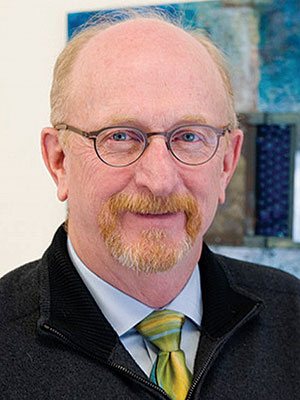One of the ACR Convergence 2020 educational sessions will examine the ongoing work into finding ways to treat rheumatoid arthritis early enough to delay the onset of symptoms or possibly reverse the course of the disease entirely and keep arthritis from developing.
Resetting Immune Tolerance for the Prevention of RA will take place on Sunday, Nov. 8, from 3 – 4 p.m. This first presentation of the session will have a live question-and-answer period, but registered attendees will have on-demand access to watch a replay of the session through Wednesday, March 11, 2021.

V. Michael Holers, MD, professor of medicine and immunology and the Scoville Professor of Rheumatology, University of Colorado School of Medicine, plans to discuss ideas around transitioning from current RA treatments to mechanism-based interventions in preclinical disease. Dr. Holers will review the latest approaches currently under investigation to identify different treatment pathways.
To that end, for over a decade Dr. Holers and his colleagues have studied the preclinical phase of RA, trying to determine if it can be predicted who will develop RA and the reasons they develop the disease. A set of autoantibodies are in the blood for a prolonged period of time during this preclinical phase, and a number of observations are pointing researchers in different directions to the causal pathways.
“Most of that work is focused on two things,” Dr. Holers said. “One is the study of multiple mucosal sites, including the lung parenchyma and GI tract, to understand whether there is a specific inflammatory mechanism that could be driving the initial disease process. The second is to look at peripheral blood and see if we can find changes that might indicate a targetable therapeutic pathway.”
The ultimate goal is the prevention of disease development. Dr. Holers sees parallels between this ongoing work and how cardiovascular (CV) medicine has evolved through the decades. In the past, the first knowledge of CV disease came with a stroke or heart attack that would cause damage that couldn’t be reversed. Today, there are steps—cholesterol tests, diet, medications—that prevent development of CV disease. In RA, it may be possible to screen patients and intervene before joint damage occurs.
“This is really a team science approach in which we’re using expertise from clinical trials, clinical research, epidemiology, studies of the microbiome and studies of the immune system, incorporating genomics, antigen-specific transcriptomics, and traditional epidemiology methods, and pairing those together with single-cell technologies, to explore this question,” Dr. Holers said. “There is not one person or one group that can really figure this out. Ultimate success will require a committed group of investigators who are working closely together.”
Ronald F. van Vollenhoven, MD, PhD, chair of rheumatology and director of the Amsterdam Rheumatology Center in the Netherlands, will talk about efforts to achieve immunological tolerance in RA by targeting B lymphocytes.

Dr. van Vollenhoven will review the PRAIRI study, a clinical trial that involved patients with the autoantibodies of the preclinical phase of RA. Patients with anti-citrullinated peptide antibodies and rheumatoid factor were given rituximab in an attempt to block their B cells.
“In the end, this treatment did not prevent people from getting rheumatoid arthritis, so in that sense you could say it was a failed trial, but what it did show was that the onset of rheumatoid arthritis was delayed quite considerably by somewhere between a half-a-year and a full year,” Dr. van Vollenhoven said.
The trial was the first demonstration that showed the important role that B cells in the early stages of RA progression, Dr. van Vollenhoven said. Several other trials have been completed or are taking place right now.
Dr. van Vollenhoven noted that while early results show that these treatments can slow progression, other questions must be answered. For example, what are the ethical questions surrounding treating somebody who is in the preclinical phase, and what risks will patients face in order to prevent something that hasn’t happened, yet?
“We seem to be heading in the right direction, but it may not be the completely right way to do it,” Dr. van Vollenhoven said. “We are currently investigating what the next step could be. We know we can do better today than we could seven or eight years ago when this all started, in terms of predicting who is the right individual to be given these treatments. We’re hopeful that we will have better results.”

Peter Taylor, MD, PhD, MA, head of clinical sciences at the Botnar Research Centre within the Nuffield Department of Orthopaedics, Rheumatology and Musculoskeletal Sciences, University of Oxford, will also present during the session, examining whether the CD28 immune co-stimulation pathway offers a credible therapeutic target for preventing arthralgia progression without clinical synovitis in those seropositive to classification positive RA. The presentation will include an overview of clinical studies investigating co-stimulation inhibition as an approach to preventing the onset of RA.
For a major subgroup of individuals with RA who are seropositive, gene-environment interaction may be important in the early initiation of immune pathology, according to epidemiology studies. Dr. Taylor will also discuss why T cell activation by citrullinated peptide with subsequent activation of B cells generating ACPA that occurs well before clinical symptoms in those who eventually meet RA classification criteria is considered to be a key initiating event. He also will explain how co-stimulation blockade offers an appealing therapeutic target to prevent progression to clinical RA.
“It has become clear over the last two decades that the best achievable outcomes from therapeutic intervention in rheumatoid arthritis are achieved when treatment is initiated as early as possible in the disease course,” Dr. Taylor said. “With this in mind, the 2010 ACR/EULAR classification criteria were formulated with a view to facilitating early treatment initiation. However, it remains to be seen whether it is possible to halt the progression of immunological events to the point of fulfilling classification criteria in susceptible, seropositive individuals who present with arthralgia.”
